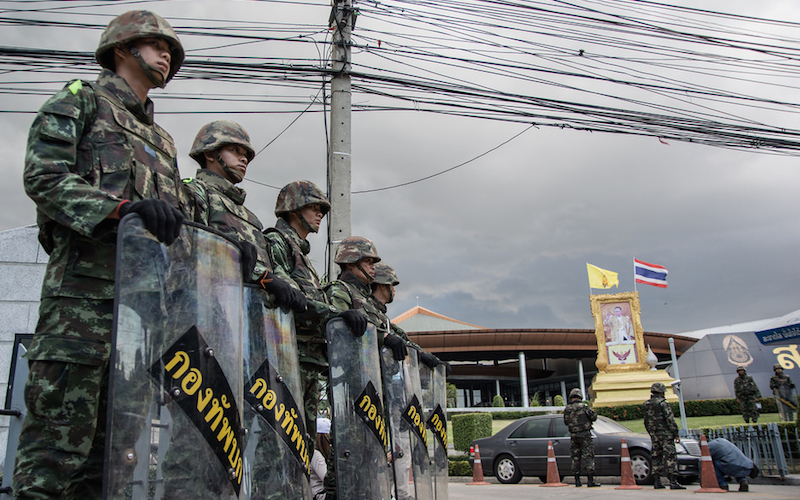
Thailand’s Quiet Dictatorship
“Our country has seen so much trouble because we have had too much democracy.” This extraordinary statement was made at a press conference on March 23 by Thailand’s Prime Minister and the man behind last year’s military coup, General Prayuth Chan-ocha. The ruling junta, ironically named the National Council for Peace and Order (NCPO), came to power on May 22, 2014 after ousting the government of Yingluck Shinawatra in a bloodless takeover. Now, more than a year later, the military regime is firmly embedded in Thailand’s political life and has grown more and more repressive, going to outlandish extents to silence critics.
Many Thais protesting the authorities have taken it upon themselves to show the three-fingered salute from The Hunger Games films and have even set up “sandwich parties” as a guise for political sit-ins. The authorities have issued a slew of laws, allowing them to take action against such grassroots protest movements. For example, last summer, eight students were arrested and interrogated for the crime of “eating sandwiches with political intent.” Such events make the general and his cohorts seem like part of some slapstick satirical comedy. Sadly, they are not. Instead, these oafish generals are the main actors responsible for the fast decline of fundamental human rights in this country of 67 million.
What was supposed to be a caretaker government, with a limited mandate to organize elections and restore “full democracy” within 15 months, has launched a massive crackdown on Thailand’s leading political figures.
On May 27, ex-prime minister and national icon Thaksin Shinawatra was accused by Thai authorities of violating the lese majeste law and have revoked his two Thai passports.
Authorities claimed it was due to an interview he gave in Seoul in which he stated that several advisors to the king had a hand in last year’s military coup that ousted the government of his sister Yingluck. The lese majeste law in question (article 112 of the Thai Penal Code) enables the government (currently the military junta) to arrest anyone who is seen to have defamed the royal family in any way and be sentenced up to 15 years in prison per count.
Thaksin is seen as one of the leading voices for a democratic Thailand and even though he has been living in self-imposed exile since 2006, when he was also overthrown by a military coup, he retains a great deal of influence over the pro-democratic movement in Thailand. Yingluck, his sister, is facing accusations of her own on trumped up charges of having implemented a rice subsidy scheme that backfired and failed to produce the intended results.
Human Rights Watch has been closely following the situation in Thailand and published on May 22 the results of their research into the first year of General Prayuth’s tenure. They found that Article 112, whose enforcement is now in the remit of military courts, has been overzealously applied and used as a tool of political repression. They also noted that, since the coup, military courts have tended to impose harsher sentences on those charged and have started prosecuting individuals for their online activity. Thiansutham Suttijitseranee (also known as “Yai Daengduad”) was sentenced to 50 years in prison for five counts of lese majeste due to posts found on his Facebook page. After pleading guilty, the sentence was halved to 25 years. Coupled with the moves taken against ex-prime ministers Thaksin and Yingluck, the junta’s abuses and the clamping down on any opposition to their rule is proof of a nascent military dictatorship in Thailand under the iron hand of general Prayuth.
Indeed, Brad Adams, Human Rights Watch’s Asia director, alerted the international community to the fact that “one year since the military coup, Thailand is a political dictatorship with all power in the hands of one man.” He continued his warning stating that “the date for elections continues to slide, with no certainty when they will happen.” General Prayuth recently declared on CNN that his government will be unable to hold elections as promised in April 2016 since the NCPO has yet to draft the country’s new constitution and that the date has been pushed back to August-September 2016 “at the earliest.”
Such worrying developments should push the international community into action; instead both the U.S. and the EU have so far sat in silence. In spite of the obvious string of abuses perpetrated by the NCPO, no action has been taken to curb its power. With the King’s declining health and probable impending death, Thailand could slip into further chaos, further empowering the tight rule of the NCPO. With every day passing day, the possibility for any form of peaceful transition of power is to be growing ever more distant.
Therefore, avoiding a messy, or worse, a bloody handover of power should rank high up on the agenda of the international community, especially with the countries that wield the most leverage over Thailand. Through targeted sanctions and by applying diplomatic pressures to protect human rights, the European Union and the United States have the capacity to drastically increase the costs for general Prayuth’s junta.
The EU and the U.S. need to take an approach to the situation that is best for the people of Thailand by focusing on the issues that matter most: free and fair elections and respect for fundamental human rights. The West should stay ahead of the curve and stop Thailand’s autocratic slide as quickly as possible. Otherwise, Brussels and Washington would breach yet again the democratic ideals they so pride themselves on defending.
